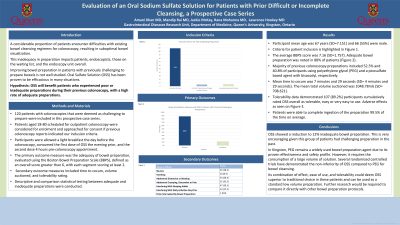Sunday Poster Session
Category: General Endoscopy
P0672 - Evaluation of an Oral Sodium Sulfate Solution for Patients With Prior Difficult or Incomplete Cleansing - A Prospective Case Series
Sunday, October 27, 2024
3:30 PM - 7:00 PM ET
Location: Exhibit Hall E

Has Audio

Amani Khan, MD
Queen's University
Kingston, ON, Canada
Presenting Author(s)
Amani Khan, MD1, Mandip Rai, MD, MSc2, Jackie McKay, BSc2, Rana Mohanna, MD2, Lawrence Hookey, MD2
1Queen's University, Kingston, ON, Canada; 2Gastrointestinal Diseases Research Unit, Queen's University, Kingston, ON, Canada
Introduction: A considerable proportion of patients encounter difficulties with existing bowel cleansing regimens for colonoscopy, resulting in suboptimal bowel visualization. This inadequacy in preparation impacts patients, endoscopists, those on the waiting list, and the endoscopy unit overall. Oral Sulfate Solution (OSS) has been proven to be efficacious in many situations and we hypothesized that it would benefit patients who experienced poor or inadequate preparations during their previous colonoscopy.
Methods: A total of 120 patients with colonoscopies that were deemed as challenging to prepare were included in this prospective case series. Patients scheduled for outpatient colonoscopy were considered for enrolment and approached for consent if previous colonoscopy reports indicated our criteria of suboptimal preparation. Participants were allowed a light breakfast the day before the colonoscopy, consumed the first dose of OSS the evening prior, and the second dose 4 hours pre-colonoscopy appointment. The primary outcome measure was the adequacy of bowel preparation, evaluated using the Boston Bowel Preparation Scale (BBPS), defined as an overall score greater than 6, with each segment scoring at least 2. Secondary outcome measures included time to cecum, volume suctioned, and tolerability rating. Analysis of descriptives and comparisons between adequate and inadequate preparations were conducted.
Results: Participant mean age was 67 years (SD=7.151) and 54 (45%) were female. 20% had diabetes. The average BBPS score was 7 (SD=1.757). 88% of the patients had an adequate preparation. 52.5% and 40.8% of participants used polyethylene glycol and a picosulfate based agent with bisacodyl in their past colonoscopy, respectively. Tolerability data demonstrated 107 (89.2%) participants cumulatively rated OSS overall as tolerable, easy or very easy to use. Patients were able to complete ingestion of the preparation 99.5% of the time. Nausea was experienced in 46 (38.3%) participants, 10 (8.3%) vomited, and 51 (42.5%) noted abdominal cramping, discomfort or pain.
Discussion: OSS showed a reduction to 12% inadequate bowel preparation. This is very encouraging given this group of patients had challenging preparation in the past. Its combination of effect, ease of use, and tolerability could deem it superior to traditional choice in these patients and can be used as a standard low volume preparation.
Disclosures:
Amani Khan, MD1, Mandip Rai, MD, MSc2, Jackie McKay, BSc2, Rana Mohanna, MD2, Lawrence Hookey, MD2. P0672 - Evaluation of an Oral Sodium Sulfate Solution for Patients With Prior Difficult or Incomplete Cleansing - A Prospective Case Series, ACG 2024 Annual Scientific Meeting Abstracts. Philadelphia, PA: American College of Gastroenterology.
1Queen's University, Kingston, ON, Canada; 2Gastrointestinal Diseases Research Unit, Queen's University, Kingston, ON, Canada
Introduction: A considerable proportion of patients encounter difficulties with existing bowel cleansing regimens for colonoscopy, resulting in suboptimal bowel visualization. This inadequacy in preparation impacts patients, endoscopists, those on the waiting list, and the endoscopy unit overall. Oral Sulfate Solution (OSS) has been proven to be efficacious in many situations and we hypothesized that it would benefit patients who experienced poor or inadequate preparations during their previous colonoscopy.
Methods: A total of 120 patients with colonoscopies that were deemed as challenging to prepare were included in this prospective case series. Patients scheduled for outpatient colonoscopy were considered for enrolment and approached for consent if previous colonoscopy reports indicated our criteria of suboptimal preparation. Participants were allowed a light breakfast the day before the colonoscopy, consumed the first dose of OSS the evening prior, and the second dose 4 hours pre-colonoscopy appointment. The primary outcome measure was the adequacy of bowel preparation, evaluated using the Boston Bowel Preparation Scale (BBPS), defined as an overall score greater than 6, with each segment scoring at least 2. Secondary outcome measures included time to cecum, volume suctioned, and tolerability rating. Analysis of descriptives and comparisons between adequate and inadequate preparations were conducted.
Results: Participant mean age was 67 years (SD=7.151) and 54 (45%) were female. 20% had diabetes. The average BBPS score was 7 (SD=1.757). 88% of the patients had an adequate preparation. 52.5% and 40.8% of participants used polyethylene glycol and a picosulfate based agent with bisacodyl in their past colonoscopy, respectively. Tolerability data demonstrated 107 (89.2%) participants cumulatively rated OSS overall as tolerable, easy or very easy to use. Patients were able to complete ingestion of the preparation 99.5% of the time. Nausea was experienced in 46 (38.3%) participants, 10 (8.3%) vomited, and 51 (42.5%) noted abdominal cramping, discomfort or pain.
Discussion: OSS showed a reduction to 12% inadequate bowel preparation. This is very encouraging given this group of patients had challenging preparation in the past. Its combination of effect, ease of use, and tolerability could deem it superior to traditional choice in these patients and can be used as a standard low volume preparation.
Disclosures:
Amani Khan indicated no relevant financial relationships.
Mandip Rai indicated no relevant financial relationships.
Jackie McKay indicated no relevant financial relationships.
Rana Mohanna indicated no relevant financial relationships.
Lawrence Hookey: Pendopharm – Consultant.
Amani Khan, MD1, Mandip Rai, MD, MSc2, Jackie McKay, BSc2, Rana Mohanna, MD2, Lawrence Hookey, MD2. P0672 - Evaluation of an Oral Sodium Sulfate Solution for Patients With Prior Difficult or Incomplete Cleansing - A Prospective Case Series, ACG 2024 Annual Scientific Meeting Abstracts. Philadelphia, PA: American College of Gastroenterology.
